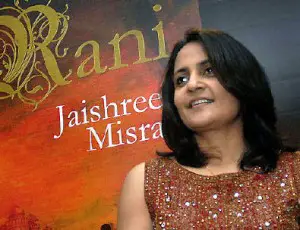by Nandini Muralidharan
 Indian writing in English has won a lot of critical acclaim in the literary world, and Indian authors have really made it big with some fantastic masterpieces. Jaishree Misra, is one Indian author, who took the literary world by storm with her debut novel “Ancient Promises
Indian writing in English has won a lot of critical acclaim in the literary world, and Indian authors have really made it big with some fantastic masterpieces. Jaishree Misra, is one Indian author, who took the literary world by storm with her debut novel “Ancient Promises”. Misra was born in a Malayali family, in New Delhi and has spent her childhood in New Delhi, Bangalore and a part of it in England. She has worked in the fields of Special Education, Social Services, as a journalist for BBC, and also in the British Board of film classification in London. Misra’s first novel Ancient Promises really made its mark in the world of literature. Her subsequent works “Accidents like love and marriage” and “Afterwards” too had the themes of love and loss, which her first novel had highlighted. But these are different and enjoyable in their own right.
Jaishree Misra signed a three book deal with Avon, the commercial fiction imprint of Harper Collins in the UK. The first of these was “Secrets and Lies”, released in June 2009. “Secrets and Lies” is a poignant tale of friendship, murky pasts, insecurities and love. The next in line is “Secrets and Sins”, which is all set for release in July 2010.
In an interview with Bookshopblog.com, Misra tells us about her passion for writing, the predominant themes in her novels, her endeavours in setting up a unit for young people with special needs and shares some tips with budding writers.
1. The themes that runs across ‘Ancient Promises’, ‘Accidents like Love and Marriage’ and ‘Afterwards’ are love, heartbreak and marriage in an Indian setting. Any specific reason for focus on these? Would these have been written even if you spent your entire life in the UK?
[Jaishree Misra] With the possible exception of ‘Rani’, my writing does seem to traverse the broad territories you mention and, to a large extent, even ‘Rani’ is not entirely free of these! I do think, however, that most novels encompass, broadly, themes like ‘love’ and ‘loss’. If you write about life, these are stories that are hard to escape. I doubt that would have changed much, had I never lived in India. Such themes are universal.
 2. Rani was a change from the previous three. It’s a beautifully written work about the Rani of Jhansi, and Mani the little girl who will always be at the heart of whatever the Rani does. Her evolution from Manikarnika to the Rani of Jhansi has been depicted with superb craftsmanship. How were you inspired to choose this powerful life to write about?
2. Rani was a change from the previous three. It’s a beautifully written work about the Rani of Jhansi, and Mani the little girl who will always be at the heart of whatever the Rani does. Her evolution from Manikarnika to the Rani of Jhansi has been depicted with superb craftsmanship. How were you inspired to choose this powerful life to write about?
[JM] I was looking for a strong Indian female character from the British-Indian period and Rani Lakshmibai was the obvious choice. So obvious, in fact, that I relegated her to the bottom of the list and looked at a whole lot of others first (our history is rich with strong women, you’d be glad to know)! But something kept pulling me back to Lakshmibai and, the more I read, the more fascinated I grew. Especially on finding that she was a far more interesting character than the uni-dimensional martial figure my school books had told me of. I realized what a modern sensibility she was blessed with and was doubly fascinated by how hard she tried not to go to war until pushed to the wall. A pacifist and a diplomat made for a far more layered biography, in my view, than a fighter and warrior and thus I was hooked!
3. You have grown up in Delhi, Bangalore and have lived in the UK for a while, before moving back to Delhi again now. How has the diversity of cultures in these cities, mingled with the Keralite upbringing influenced your writing?
[JM] Again, all my books cover these physical territories. These places have certainly informed my writing but I’m not sure if they’ve influenced it. Yes, all these places enjoy greatly diverse cultures and I’m surely enriched by them I do think it’s quite possible to be a sensitive and empathetic novelist even without varied experiences. Too often the examples of Jane Austen and the Brontes are given to illustrate this but they do bear thinking about.

